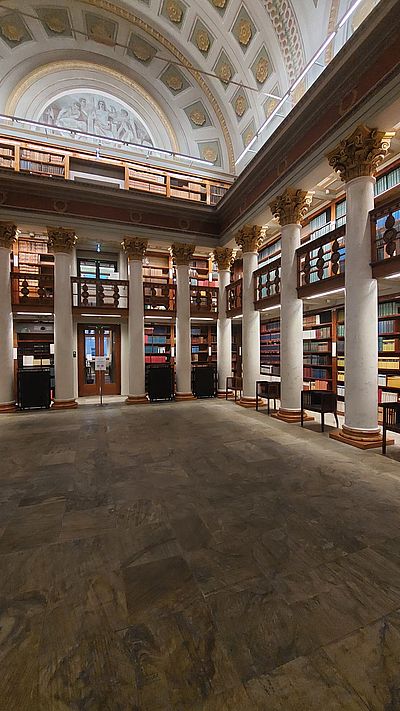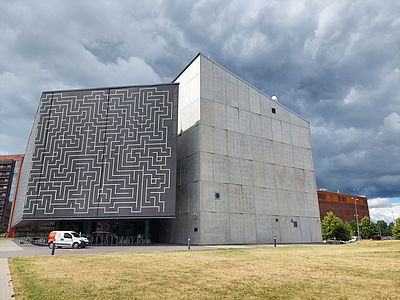On the field with Daniela Munteanu - Archives and history of psychiatry in the Russian Empire.
13. Juni
Dynamiken und Erfahrungen der Globalisierung
Daniela Munteanu was this semester at the CMB as a PhD fellow. She writes us about her research and the impact of the war in Ukraine on her fieldwork.
I am second-year doctoral student at Central European University in Vienna, currently a research fellow at Centre Marc Bloch in Berlin. My research area is the history of the human sciences in nineteenth century. In particular, I study the history of self and personhood, and its various constituent elements. I am interested in tracing the emergence and development of those concepts and practices that are eventually employed by people to refer to their sense of selves, their mental health and place in the world. I consider the historical, political, ideological and social circumstances within which scientists theorised about self, its health and normality. I look at practices used to designate normality and abnormality and the categories along which this categorisation occurred – gender, race, ethnicity and religion.
Research Topic
The history of self goes as back as ancient philosophy with a rich development in the Renaissance and later Romanticism and Idealism. In nineteenth century it became prerogative of several emerging scientific disciplines– psychology, neurology and psychiatry. For my doctoral thesis I research the history of self as conceptualised by the various human sciences in late nineteenth-century Russian Empire. Self or lichnost´ is a concept central to Russian intellectual thought. Its meaning and role in social and political life changed following the rich theorisation of self and its constituent elements, as well as its health and normality within various scientific disciplines. In my research I am especially interested in the pathologies of the self and how these informed new definitions of a “normal” and “healthy” self. I look at how disciplines like psychiatry and experimental psychology made of self their object of study, and how these sought professional and institutional recognition around their research on and nurture of self. It is my belief that psychiatrists and psychologists, through various pathologies and laboratory experiments, envisioned the model self they wanted to see as subject and citizen of the empire, when the latter was undergoing a modernization that challenged its political and social order.
In my research, in particular, I study one element of the self – will (Willenskraft or volonté) and how it accounted for the individual´s morality. The Great Reforms of the 1860s and 1870s paved the way for new forms of subjectivity and practices of self-fashioning, that, scientists thought, challenged the established moral regimes of the empire. I ask how this medicalization of will – localized now in the reflex arcs of the nervous system – accounted for this endangered morality and resulted in scientifically proved programs to guard it. I look at how this scientific knowledge around will and self informed debates about legal responsibility and the ones around subjecthood and citizenship in an empire undergoing modernization and internal challenges on political, social and cultural accounts. Ultimately, I am looking at how this version of scientific self interlaced and informed the definition and making of other forms of subjectivity – social, legal and political, all this, in a multi-ethnic, multi-confessional and socially stratified empire.
Archival Research and Activities in Berlin and at CMB
In this second year of my PhD I do archival research. For this project I work with published manuscripts, like monographs and scientific journals, as well as archival materials and psychiatric case records. I was initially supposed to travel to Ukraine and Russia to consult archives and libraries. The scientists, hospitals and laboratories I intended to initially study are located in present day Ukraine and Russia. However, due to the full-scale war I had to revise the initially planned route. In this way, I spent time in the archives and libraries in Tallinn and Tartu in Estonia and in Helsinki, Finland. It turned out that I could also find some useful material in the Berlin libraries. I came to Berlin to keep improving my German, since some of my sources are in German, and for the eclectic and multi-disciplinary environment at CMB, that I found very fruitful for my research.
I very much benefited from the presentations and conversations during the seminars and workshops of the research pole Dynamics and Experiences of Globalisation, of which I was part during my stay at CMB. The multi- and inter-disciplinary discussions encouraged me to ask new questions and look at my research from new angles. I very much cherished the opportunities to reflect on my research with colleagues studying similar topics or not, as well as to reflect together on methodologies and challenges of historical research today. Among my highlights at the Centre are the discussions of the Séminaire Central, where I attended presentations on multiple topics in various disciplines speaking to many urgent challenges we are facing today as researchers and members of the public. What fascinated me was how during these sessions the dialogue unfolded from questions coming from various points of view and research disciplines, and how these intersected on common methodological or conceptual grounds. I cannot imagine a better and more fruitful way of doing research than this multi-disciplinary exchange.
While in Berlin, I also intended to consult some manuscripts that the Russian scientists that I research cite in their work. While I am not doing a comparative history per se, I pay attention in my research to the commensurability and translatability of various concepts like will, self, personhood from various languages, German included. With there being no perfect translation between one language to another, I consider how much of the cultural, social and political meaning is kept and lost during this translation into another language and scientific, and ideological situation. As it turned out, however, I managed to find in Berlin, at the Staatsbibliothek, some Russian titles that complement my bibliography at this moment.
Researching and Writing History Today
After the shock of the first months of full-scale war, when many of us, each in their own way, tried to help, we had to eventually face the question of our field work. Being unable to travel to both countries, it forced us to readjust our archival bibliographies and somewhere the research angle. We turned to other archives and libraries in countries that were once imperial or soviet territories and harbour, each to different extent, materials and sources that we can now consult. This, however, cannot and is not to be compared to the plight of my colleagues who stayed or returned to Ukraine, and continue their research there, under shell bombing. Their access to the archives and libraries is also restricted due to curfews and air raids. In the years to come we will have to reckon with how this war changed the way we do history: both in terms of the questions we ask and methodologies we develop, as well as in terms of the way we think and access archives and sources. In a time when distorted and falsely fabricated accounts of history are being employed to justify crimes against humanity and of aggression, it is important that we find ways to continue researching and asking questions that challenge these narratives of violence and oppression.
Kontakt:
Daniela Munteanu
daniela.munteanu ( at ) cmb.hu-berlin.de

